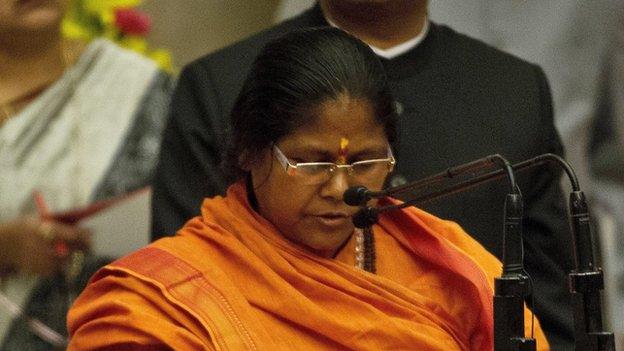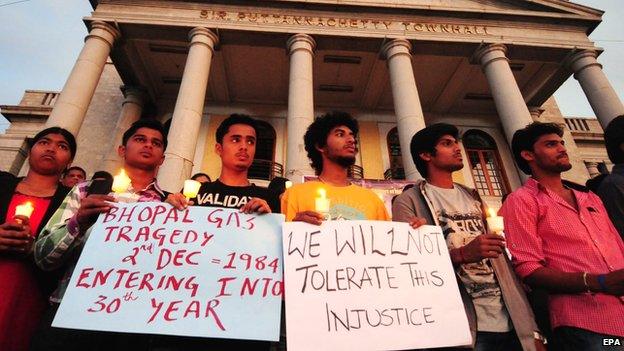Indian media: 'Hate speech' row engulfs BJP minister
- Published

Ms Jyoti was sworn in as a member of the BJP-led government last month
India's front pages are dominated by a row over a BJP junior minister's use of an abusive term for opposition members variously described by papers as "hate speech" or "invective".
The dispute erupted after Food Processing Minister Sadhvi Niranjan Jyoti told an election rally in Delhi on Monday that voters faced a choice between a "government of followers of Lord Rama and a government of bastards".
She has since apologised in the parliament, but the opposition parties have nevertheless called for her to resign.
According to The Pioneer, external, Ms Jyoti had initially stood by her remarks, saying she had been referring to "anti-nationals" who "loot the nation".
Several BJP figures have also condemned the remarks, and Prime Minister Narendra Modi told MPs that her remarks were "not acceptable", The Hindu , externalreports.
But the New Indian Express, external believes the issue is "unlikely to go away", and may paralyse the parliament after opposition forced the adjournment of several sessions.
The Hindustan Times , externalaccuses BJP spokeswoman Sambit Patra of appearing to defend Ms Jyoti by described her comments as "slip of tongue" that should not be politicised.
The Calcutta Telegraph, external says the row has made the government "look besieged for the first time in its six months", and for the Firstpost, external, the incident is "not just embarrassing, but diminishing" for Mr Modi.
It adds that the "enormity of the offence" has succeeded in uniting - at least temporarily - a fractured opposition and "brought back an abusive, socially regressive and politically disastrous discourse to the fore".
A commentary , externalin the paper says Ms Jyoti's "appalling" use of the word had a sectarian tinge and was evidence of an "us versus them" mentality.
"It is stoking a sense of Hindu supremacy while labelling any counter-view illegitimate," the paper says.
'No more Bhopals'
Several Indian commentators debate the legacy of the catastrophic Bhopal chemical leak 30 years ago, warning of the need to learn lessons and avoid a repeat of the tragedy.
Activist Sunita Narain writes in The Times of India, external that the mistakes made during and after the disaster - the failure to prosecute many of those responsible, to treat the damage to survivors' health and to decontaminate - need to be rectified.

Candle-lit vigils have been held across India to mark the 30th anniversary of the disaster
"It is time to put this right," she says. "Bhopal isn't about our terrible past. It is about our future".
In the Hindustan Times, external, Darryl D'Monte argues that the Union Carbide plant leak shows the "deep-seated class divide when it comes to victims of industrial disasters".
"Because most of those who inhaled the poisonous gas were slum dwellers, they did not receive as much attention as would have better-off residents," he writes, pointing out that it is not even known exactly how many people died in the disaster.
"Bhopal reminds us of how one values lives, especially those of the poor."
For lawyer and activist Indira Jaising, Bhopal shows the need for an agreement on the international liability of multinationals such as Union Carbide.
"The disaster has not left a legal legacy to be proud of," she writes in The Indian Express, external. "International law must step in and address the unresolved issues of the tragedy."
Holy clones
And finally, the government of Tamil Nadu has ordered Hindu temples in the state to preserve their sacred trees for posterity by cloning them, The Hindu , externalreports.
In a statement, the Hindu Religious and Charitable Endowments Department says the ancient plants known as Sthala Vriksha, such as the 3,000-year-old mango tree at the famous Ekambershwara Temple in Kancheepuram, are "unique germplasms".
The directive says temples must ensure that enough of the clones are kept in quarantine in the temple flower garden, along with notices in Tamil, English and Sanskrit detailing the species and the sacred legend associated with the plant.
BBC Monitoring, external reports and analyses news from TV, radio, web and print media around the world. You can follow BBC Monitoring on Twitter, external and Facebook, external.